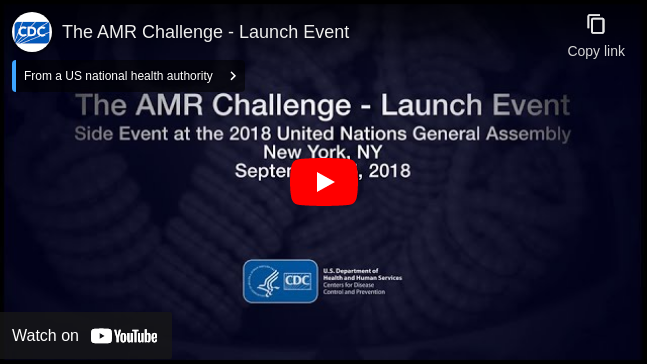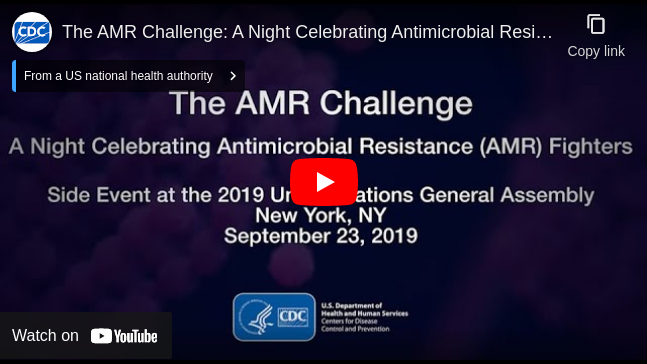The AMR Challenge
Held September 2018 to September 2019
The Antimicrobial Resistance (AMR) Challenge was a yearlong effort by the U.S. government to accelerate the fight against antimicrobial resistance. The Challenge resulted in more than 350 organizations across 32 countries committing to slow antimicrobial resistance.
The Challenge kicked off and concluded at United Nations (UN) General Assembly side events in 2018 and 2019. The events were attended by representatives from governments, private industry, and organizations committed to prioritizing antimicrobial resistance. Although CDC is no longer accepting commitments, please email ARX@cdc.gov if interested in combating this threat together.
These activities build on U.S. momentum since 2015 to support the National Action Plan for Combating Antibiotic-Resistant Bacteria, including antibiotic use commitments made at the White House Forum on Antibiotic Stewardship.
Commitments
The AMR Challenge encouraged a One Health approach, recognizing that the health of people is connected to the health of animals and the environment. CDC, on behalf of the U.S. government, encouraged commitments that focused on at least one of the five commitment areas:
- Tracking and data: Share data and improve data collection
- Infection prevention and control: Reduce the spread of resistant germs
- Antibiotic use: Improve antibiotic use, including ensuring people can access these medicines when needed
- Environment and sanitation: Decrease antibiotics and resistance in the environment, including improving sanitation
- Vaccines, therapeutics, and diagnostics: Invest in development and improved access
Among The AMR Challenge commitments received since September 2018:
- Committed organizations represented more than 10,000 healthcare facilities around the world. Nearly 45% of commitments focused on improving infection prevention and control, which helps stop the spread of resistant germs and prevents infections.
- Forty-seven organizations made commitments related to safe drinking water, sanitation, and hygiene (WASH). Access to adequate sanitation and hygiene (e.g., water for handwashing) can help to stop infections, reduce the need for antibiotics, and slow the spread of antimicrobial resistance.
- Nearly half of the commitments focused on improving antibiotic use, which helps slow the development of antimicrobial resistance and protects patients from unnecessary antibiotics and their side effects.
- Major food corporations used their purchasing power to improve antibiotic use.
- More than 55 pharmaceutical and biotech groups committed to develop or provide access to products that will prevent and treat resistant infections.
- All 50 U.S. state public health departments and Washington, D.C. participated in the national fight against antimicrobial resistance. California, Illinois, and Washington, D.C. demonstrated the highest number of domestic commitments with action from more than 20 organizations in each.
- CDC received more than 76 commitments from 32 countries outside of the U.S. and across six continents, reaching nearly 3 billion people around the world.
Read the commitments [PDF – 69 pages] from more than 350 organizations across 32 countries to slow antimicrobial resistance.
Live Event Videos
On September 25, 2018, the U.S. Government and CDC launched The AMR Challenge. The event gathered more than 300 attendees from nearly 200 influential organizations.
The United States celebrated the success of The AMR Challenge in September 2019. The AMR Challenge is one of the most ambitious global initiatives to date to combat the growing threat of antimicrobial resistance.

